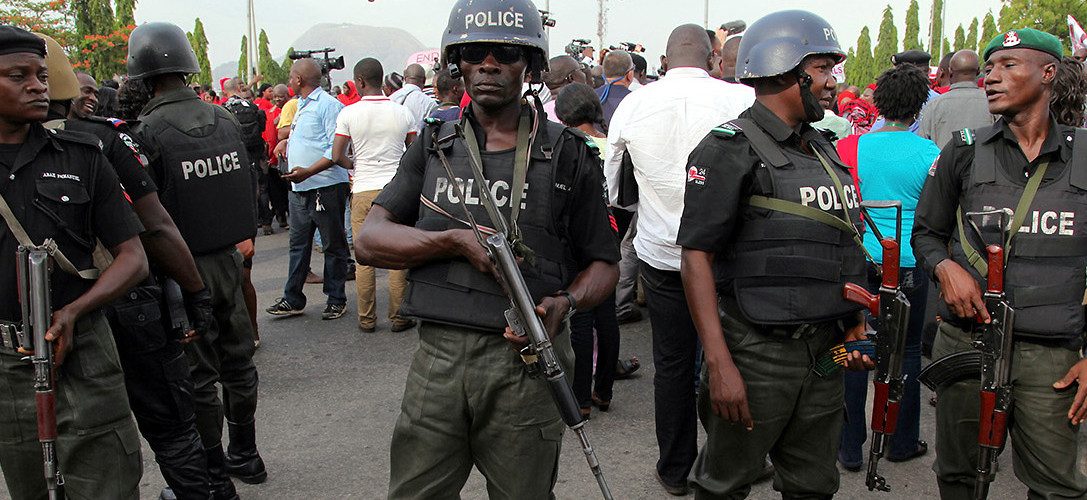Nigerian police stand guard at a demonstration against Boko Haram‘s kidnapping of more than 270 schoolgirls. Abuja, Nigeria, May 22, 2014. (Nacer Talel/Anadolu Agency/Getty Images)
The governor of Nigeria’s Kaduna State, Nasir El-Rufai, claimed that a suicide bombing that killed about 40 people in the city of Zaria earlier this month could have been prevented if Nigeria had a larger police force. This is a domestic policy that new Nigerian President Muhammadu Buhari is reportedly considering as he attempts to end the Boko Haram insurgency. However, merely employing more officers without reforming the country’s police force and prison system would be ineffective at best, and could even empower extremists.
The Zaria bombing was attributed to Boko Haram, as part of a campaign that has killed more than 600 people since the May inauguration of Buhari, and more than 19,000 in total during the past five years. The new president was elected on a platform that emphasized his military credentials and willingness to crack down on the insurgency. One of his first acts was to meet with regional partners to discuss the Multi-National Joint Task Force’s (MNJTF) efforts against Boko Haram.
The high expectations placed on Buhari have not yet been met—the militants have demonstrated a remarkable capacity to alter their operational characteristics in response to increasing governmental presence and pressure in their northern stronghold. While much has been made of the international connections of the Boko Haram insurgency and the regional efforts of the MNJTF, Buhari must also implement the domestic reforms necessary to reduce the appeal of anti-government movements and prevent the development of additional insurgencies in Boko Haram’s mold.
El-Rufai claimed that Buhari was receptive to his call for Nigeria to have twice the police force as present, and was working on implementing it. Unfortunately, simply increasing officer numbers will not necessarily translate into a more secure Nigeria. Without reforming the overall police and prison system, it will only paper over the deep societal mistrust of the justice apparatus and continue to give authority to extremists and anti-state actors.
A careful look at the Nigerian justice system reveals it promotes human rights abuses that serve to alienate citizens from the government—a dynamic that Boko Haram has leveraged in its propaganda to validate its violent campaign. According to a Nigerian Prisons Service official, of the 56,785 inmates in Nigerian prisons in 2014, only 17,775 had been convicted of a crime—the remaining two-thirds were awaiting trial.
Rights groups assert that “hundreds of people died from neglect or mistreatment in Nigerian prisons” as recently as 2013. It is, according to Suleiman Shuaibu, the president of the African Youth for Conflict Resolution, “a national problem,” with congested prisons and poor living and sleeping conditions prolonging the suffering of inmates.
The process of detaining suspected criminals is similarly fraught, with the Nigerian legal framework granting police wide powers of arrest: all that is required is “reasonable suspicion” that an individual has committed, or is about to commit a crime. As a result, there is evidence that police officers have regularly severely beaten, sexually assaulted, and shot to death citizens who failed to pay the bribes demanded of them. Open Society Foundation and the Network on Police Reform in Nigeria have reported many ex-detainees being tied up and painfully suspended in mid-air. They were then beaten and tortured with items including machetes, gun butts, boots, fists, electrical wires, and animal hides.
In 2012, the chairman of the governing council of Nigeria’s National Human Rights Commission estimated that 2,500 Nigerian detainees are summarily killed by the police every year. The impunity enjoyed by these officers is all the more troubling considering the scale of the police force—it is the largest employer in the country, responsible for nearly 400,000 jobs.
The impunity with which the Nigerian police abuse citizens has, unsurprisingly, instilled a deep mistrust among the community. According to survey data, only half the country would report a crime to the police. Of those who would not, 31% said they avoided the police because they would have demanded a bribe to help.
This sense of alienation has in turn galvanized Boko Haram, which has broken into more than 20 prisons and freed an estimated 2,000 prisoners, according to Jamestown Foundation analyst Jacob Zenn. This campaign began in 2010, with a prison break in Bauchi State that freed an estimated 700 prisoners, and has been accompanied by a robust public relations campaign. The insurgency has recorded several of the major attacks on video and photograph, including the Bauchi prison break, and used the films as propaganda to portray its strength. These videos not only highlight the deplorable conditions of the prisons, but also portray Boko Haram leader Abubakar Shekau as a magnanimous liberator.
Nigeria has made some efforts to attempt to reform its justice system. In 2009, for example, then President Goodluck Jonathan established a committee to address issues related to extrajudicial executions and torture. However, a review conducted by Amnesty International four years later concluded that the committee’s budget was inadequate and, as a result, police “continue to commit human rights violations with impunity, including extrajudicial executions.”
Future efforts will need to be better-resourced and more effectively targeted at enforcing the rule of law, removing human rights abuses, alleviating poor prison conditions, and addressing other outcomes that serve to sustain popular dissent and empower extremist groups. A bigger security force is not necessarily a more effective one—Nigerian efforts at improving its security situation must recognize that current problems stem from the force’s corruption and intimidation, rather than its size. While Boko Haram has metastasized into a regional threat with international allegiance, ending its reign of violence requires radical reform at the domestic level.
Hilary Matfess is a researcher at the Center for Complex Operations at the National Defense University, Washington, DC.





